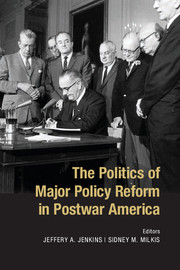Book contents
- Frontmatter
- Contents
- Contributors
- Acknowledgments
- 1 Introduction
- 2 The Long 1950s as a Policy Era
- 3 Regulation, Litigation, and Reform
- 4 Courts and Agencies in the American Civil Rights State
- 5 The Politics of Labor Policy Reform
- 6 Teachers Unions and American Education Reform
- 7 Progressive Federalism and the Contested Implementation of Obama’s Health Reform
- 8 Federalism and the Politics of Immigration Reform
- 9 Trade Politics and Reform
- 10 The Politics of Intelligence Reform
- 11 Follow the Leader
- 12 Conclusion: Madison Upside Down
- Index
- References
12 - Conclusion: Madison Upside Down
The Policy Roots of Our Polarized Politics
Published online by Cambridge University Press: 05 November 2014
- Frontmatter
- Contents
- Contributors
- Acknowledgments
- 1 Introduction
- 2 The Long 1950s as a Policy Era
- 3 Regulation, Litigation, and Reform
- 4 Courts and Agencies in the American Civil Rights State
- 5 The Politics of Labor Policy Reform
- 6 Teachers Unions and American Education Reform
- 7 Progressive Federalism and the Contested Implementation of Obama’s Health Reform
- 8 Federalism and the Politics of Immigration Reform
- 9 Trade Politics and Reform
- 10 The Politics of Intelligence Reform
- 11 Follow the Leader
- 12 Conclusion: Madison Upside Down
- Index
- References
Summary
This book’s core theme is the centrality of policy contestation to modern American politics. Of course, policy has always been of tremendous importance. Contests for political office matter because the winners get to exercise (within constitutional limits) authority, allocating value among competing claimants. Throughout the nation’s history, core political conflicts have been organized around competing views on policy. Yet Orren and Skowronek are right to stress the distinctive focus on policy as a marker of contemporary politics, and the contributors to this volume rightly follow that lead.
The valuable contributions to this volume explore aspects of this transformation in some of the key policy sectors of modern governance. In this chapter, I take a step back from the narratives of individual policy areas to consider the broad consequences of this transformation – in particular its connection to the emergence of intense partisan contestation. As the chapters in this volume make clear, each policy area has its own distinctive features. Taken as a whole, however, they can help us see how the rise of the “policy state” has altered our politics in fundamental ways.
- Type
- Chapter
- Information
- The Politics of Major Policy Reform in Postwar America , pp. 282 - 302Publisher: Cambridge University PressPrint publication year: 2014
References
- 3
- Cited by



